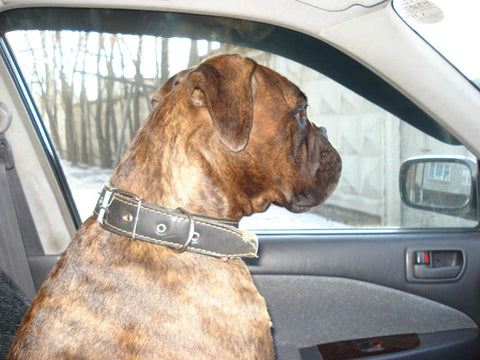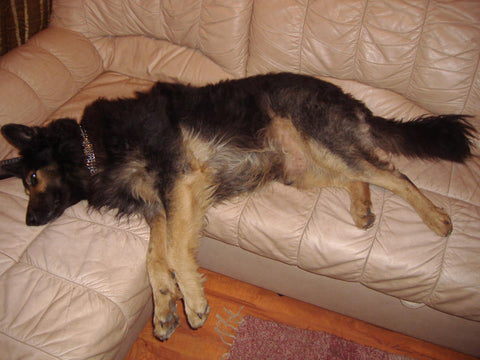Anxiety in dogs is a common problem that can affect their behavior and overall well-being. It is a normal emotional response to certain stimuli or situations, but when it becomes chronic or severe, it can interfere with a dog’s daily life and happiness.
There are many causes of anxiety in dogs, including genetics, past experiences, and changes in their environment. Separation anxiety is a common form of anxiety in dogs, where they become anxious when separated from their owners. This can manifest in a variety of behaviors, such as barking, whining, pacing, and destructive behavior. Noise phobias, such as a fear of thunderstorms or fireworks, can also cause anxiety in dogs. Medical conditions, such as a hormonal imbalance or an injury, can also contribute to anxiety.
Symptoms of anxiety in dogs can vary, but may include panting, shaking, barking, pacing, destructive behavior, and loss of appetite. It is important to recognize these symptoms and address them in order to help your dog feel more comfortable and calm.
Treatment for dog anxiety may include behavior modification techniques, such as desensitization and counterconditioning, which can help your dog learn to associate a fearful stimulus with positive experiences. Desensitization involves exposing your dog to the thing they are afraid of in a controlled and gradually increasing manner, while counterconditioning involves pairing the fearful stimulus with something positive, such as treats or praise. These techniques can be effective in helping your dog overcome their anxiety, but they require patience and consistency on your part.
Medications, such as anti-anxiety drugs or antidepressants, may also be prescribed by a veterinarian to help reduce anxiety symptoms. These medications can be effective in reducing anxiety, but they do not address the underlying cause of the anxiety and may have side effects. It is important to work with a veterinarian or a trained animal behaviorist to determine the cause of your dog’s anxiety and develop a treatment plan that is appropriate for your dog’s specific needs.
In addition to professional treatment, there are several things you can do at home to help reduce your dog’s anxiety:
- Provide a consistent routine and structure for your dog. Dogs thrive on routine and knowing what to expect can help reduce anxiety.
- Exercise your dog regularly to help reduce stress and promote relaxation.
- Use calming pheromones or music to help create a soothing environment. Calming pheromones, such as Adaptil, mimic the pheromones that a mother dog produces to calm her puppies and can be effective in reducing anxiety in dogs. Playing soothing music, such as classical or calming dog music, can also help relax your dog.
- Avoid punishing your dog for anxious behaviors, as this can increase anxiety. Instead, try to redirect your dog’s attention to a more positive behavior.
- Consider using natural remedies, such as CBD oil or herbal remedies, under the guidance of a veterinarian. These remedies may have a calming effect on your dog and can be used in conjunction with other treatment options.

It is important to remember that every dog is different and what works for one dog may not work for another. It may take some trial and error to find the best treatment plan for your dog’s anxiety.
In conclusion, anxiety in dogs is a common problem that can interfere with their daily life and well-being. There are many causes of anxiety in dogs and a variety of treatment options available. Working with a veterinarian or animal behaviorist to determine the cause of your dog’s anxiety and develop a treatment plan is the most effective way to help your dog overcome their anxiety and lead a happy and comfortable life. By providing a consistent routine, exercising your dog regularly, using calming techniques, and avoiding punishment for anxious behaviors.
Dogs, like humans, can experience anxiety. It is a normal emotional response to certain stimuli or situations, but when it becomes chronic or severe, it can interfere with a dog’s daily life and well-being.
There are many causes of anxiety in dogs, including genetics, past experiences, and changes in their environment. Separation anxiety is a common form of anxiety in dogs, where they become anxious when separated from their owners. Noise phobias, such as a fear of thunderstorms or fireworks, can also cause anxiety in dogs. Medical conditions, such as a hormonal imbalance or an injury, can also contribute to anxiety.
Symptoms of anxiety in dogs can include panting, shaking, barking, pacing, destructive behavior, and loss of appetite. It is important to recognize these symptoms and address them in order to help your dog feel more comfortable and calm.
Treatment for dog anxiety may include behavior modification techniques, such as desensitization and counterconditioning, which can help your dog learn to associate a fearful stimulus with positive experiences. Medications, such as anti-anxiety drugs or antidepressants, may also be prescribed by a veterinarian to help reduce anxiety symptoms.

It is important to work with a veterinarian or a trained animal behaviorist to determine the cause of your dog’s anxiety and develop a treatment plan. In addition to professional treatment, there are also several things you can do at home to help reduce your dog’s anxiety:
- Provide a consistent routine and structure for your dog.
- Exercise your dog regularly to help reduce stress and promote relaxation.
- Use calming pheromones or music to help create a soothing environment.
- Avoid punishing your dog for anxious behaviors, as this can increase anxiety.
- Consider using natural remedies, such as CBD oil or herbal remedies, under the guidance of a veterinarian.
Dogs are an important part of our lives and it is natural to want to do everything we can to help them when they are feeling anxious. By addressing the cause of your dog’s anxiety and implementing a treatment plan, you can help your furry friend lead a happy and comfortable life.




Add comment